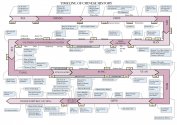Don't get me wrong as an ethnic Chinese I believe in the story of flood and Yu the great is one of my hero But we need further study to tie Erlitou to Xia dynasty. Here is an excellent article I believe I posted earlier on this thread
It got the right vibe of right timeline , right place, right human evolution from Neolitihic to bronze age
Now even archaeological proof of deluge, existence of palace structure( State), wide spread of the culture, large urban center etc
An ancient landslide once blocked the Yellow River at Jishi Gorge in China, shown here. The resulting lake eventually burst through the rubble dam, causing what may have been one of history’s largest floods.
QINGLONG WU
Massive flood may have led to China's earliest empire
By
Aug. 4, 2016 , 2:00 PM
Many cultures trace their origins to the hazy horizon where history meets legend. In China's case, that blurry line occurs sometime between 2200 B.C.E. and 2000 B.C.E., when a legendary hero named Yu tamed Yellow River flooding and earned a mandate to become the founding emperor of the Xia dynasty, the country's first. That’s the story according to texts written long after the fact, and many Chinese believe their civilization started with emperor Yu. But archaeologists have been unable to find convincing evidence for either the flood or the Xia dynasty itself.
Now, an international team of scientists drawn from the fields of archaeology, anthropology, seismology, and geology have gathered disparate evidence from ancient texts, sedimentary deposits, earthquake-triggered landslides, and skeletons in collapsed cave dwellings to craft a scenario presented this week in Science that they claim
. If the findings hold up, they could lend credence to early historical texts and help resolve a long-running debate over the origins of China and its people.
It is "a groundbreaking study," says Qingwei Sun, an archaeologist at Peking University in Beijing who was not involved in the work. Still, "more data is needed [for the findings] to be widely accepted," he says.
The paper was nearly a decade in the making. In spring 2007, the study's lead author, geologist Qinglong Wu, was working as a postdoc at the China Earthquake Administration's Institute of Geology in Beijing, when his team found ancient lakebed sediments in the Jishi Gorge at the upper reaches of the Yellow River, about 1300 kilometers west of Beijing. They speculated that at some point a lake had formed in the gorge behind rubble from a landslide. If that dam gave away, they reasoned, it would have caused a major flood.
Following a hunch that came during a sleepless night in July 2008, Wu traveled 25 kilometers downstream from the gorge, where a major earthquake had destroyed numerous cave dwellings in a Neolithic settlement called Lajia. Subsequently, a thick layer of mud engulfed the ruins and the victims, preserving them for discovery in the 1990s. Wu found that the Lajia mud matched material from Jishi Gorge, suggesting that the same earthquake that had destroyed the dwellings had also triggered the upstream landslide that set the stage for the flood. Because the sediment was quite different from what would have been washed into the ruins by rainstorms, "the earthquake and flood must have occurred in the same year," says Darryl Granger, a geologist at Purdue University in West Lafayette, Indiana, who is a co-author of the paper.
At that point, Wu began thinking that this event could be the basis for China’s great flood legend. "I didn’t tell others because it would invite laughter," he says. Instead, he quietly gathered evidence from lake deposits in the gorge and flood sediments downstream, and reached out to specialists around the world to help him interpret the data.
The team concluded that the landslide created a dam 200 meters high that choked off the mighty Yellow for 6 to 9 months. The rising water finally overtopped the rubble and then quickly washed it away, causing a torrent that could have been among the largest floods of the Holocene epoch, Granger says. It is difficult to determine when ancient floods happened, but radiocarbon dating of the Lajia human remains pegged the catastrophes to about 1900 B.C.E.
How a great flood may have spurred China’s first civilization.
SCIENCE
The massive flood “provides us with a tantalizing hint that the Xia dynasty might really have existed," says David Cohen, an archaeologist and co-author at National Taiwan University in Taipei. The devastating flood could have inundated settlements even a thousand or more kilometers downstream, he says, and created chaos from which a new political order emerged. This sequence of events neatly fits the legend of Yu controlling the flooding by dredging channels to confine the Yellow River and its tributaries. This feat, the ancient texts say, allowed him to claim a mandate as the first emperor of the Xia dynasty.
The timing is curiously coincidental. Around 1900 B.C.E., Cohen says, Chinese society was transitioning from the Neolithic to the Bronze age. The date also correlates with what is called the Erlitou culture, which is known from palace buildings and bronze smelting workshops discovered near Zhengzhou, about 2500 kilometers downstream from Jishi Gorge. Many scholars have argued that Erlitou is a manifestation of the elusive Xia dynasty, but a link is not firmly established.
Nevertheless, with hard evidence of a catastrophic flood occurring at a time of social and political change, "It's an amazing story of all these different lines of evidence coming together," Cohen says. “If the great flood really happened, then the Xia dynasty likely happened, too,” he concludes.
"It's a thought-provoking piece of work," agrees Tristram Kidder, an archaeologist at Washington University in St. Louis in Missouri, who works on several sites on the lower Yellow River. "They've done a great job showing that there was a major, catastrophic flood.”
But Haiwang Liu, an archaeologist at the Henan Provincial Institute of Cultural Relics and Archaeology in Zhengzhou, China, who collaborates with Kidder, says that at their sites in the lower Yellow, "no hard physical evidence of great floods during that time has been found." And Lothar von Falkenhausen, an archaeologist at the University of California, Los Angeles, cautions against "proposing too direct a linkage between such environmental events with semimythical accounts recorded in texts of much later date."
The new paper's findings are also at odds with other recent studies, which have proposed alternative explanations for both the Jishi Gorge deposits and the Lajia sediment, says Wenxiang Wu, a geographer at the Chinese Academy of Sciences's Institute of Geographic Sciences and Natural Resources Research in Beijing. He adds that recent radiocarbon dating refinements have suggested the Erlitou culture thrived between 1750 B.C.E. and 1530 B.C.E.—much later than the proposed new date for the Xia dynasty. The paper "needs more supporting evidence," for its claims regarding a great flood and the Xia dynasty, Wenxiang Wu concludes.
Qinglong Wu, now at Nanjing Normal University, acknowledges the paper is certain to stir up several long-simmering controversies. But in trying to make sense of disparate historical and physical evidence "our data involves fewer contradictions" than alternative explanations, he says.
One point all agree on is the need for further study. Finding evidence for a great flood along the middle and lower reaches of the Yellow River "would undoubtedly strengthen the persuasiveness of the paper,” Sun says. Wu’s team "sets out a hypothesis we can follow up—it gives us something to look for," Kidder says.
Posted in:



